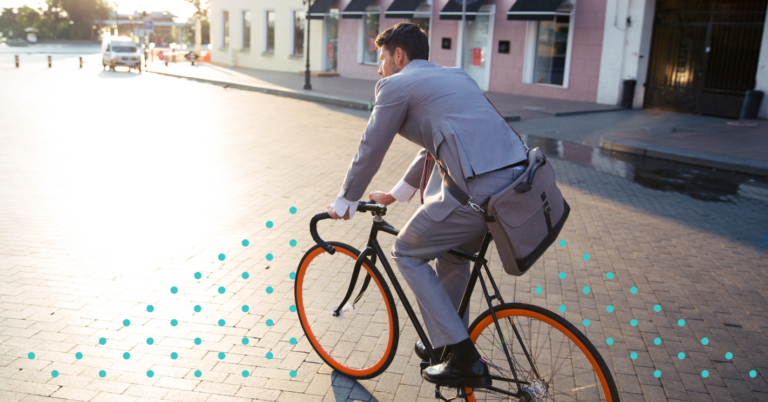Key Takeaways
- Biking commuters earn higher salaries, with an average annual income of approximately $15,000 greater than those who use other transportation methods.
- Biking commuters report saving an average of $48 per week (almost $2,500 annually) by not driving to work.
- More than half of bike commuters say their stress has decreased since they began biking to work.
- Since they began biking to work, commuters have become 27% more productive.
- The top motivators for non-bike commuters to switch to a bike were a job closer to where they live (48%), improved cycling infrastructure in their city (31%), and physical fitness and health (25%).
Biking’s Hidden Benefits
It’s hard not to show up to work stressed out when your daily commute involves a crowded bus, subway, or big-city traffic. Have you ever wondered if that co-worker who rolls up to work each day on a bike might be onto something? We recently surveyed 363 urban bike commuters and 675 non-biking commuters to find out just how big a difference biking to work can make.
The Perks of Peddling
It’s no surprise that people who regularly bike to work enjoy certain health benefits, but other benefits of biking to work might surprise you.
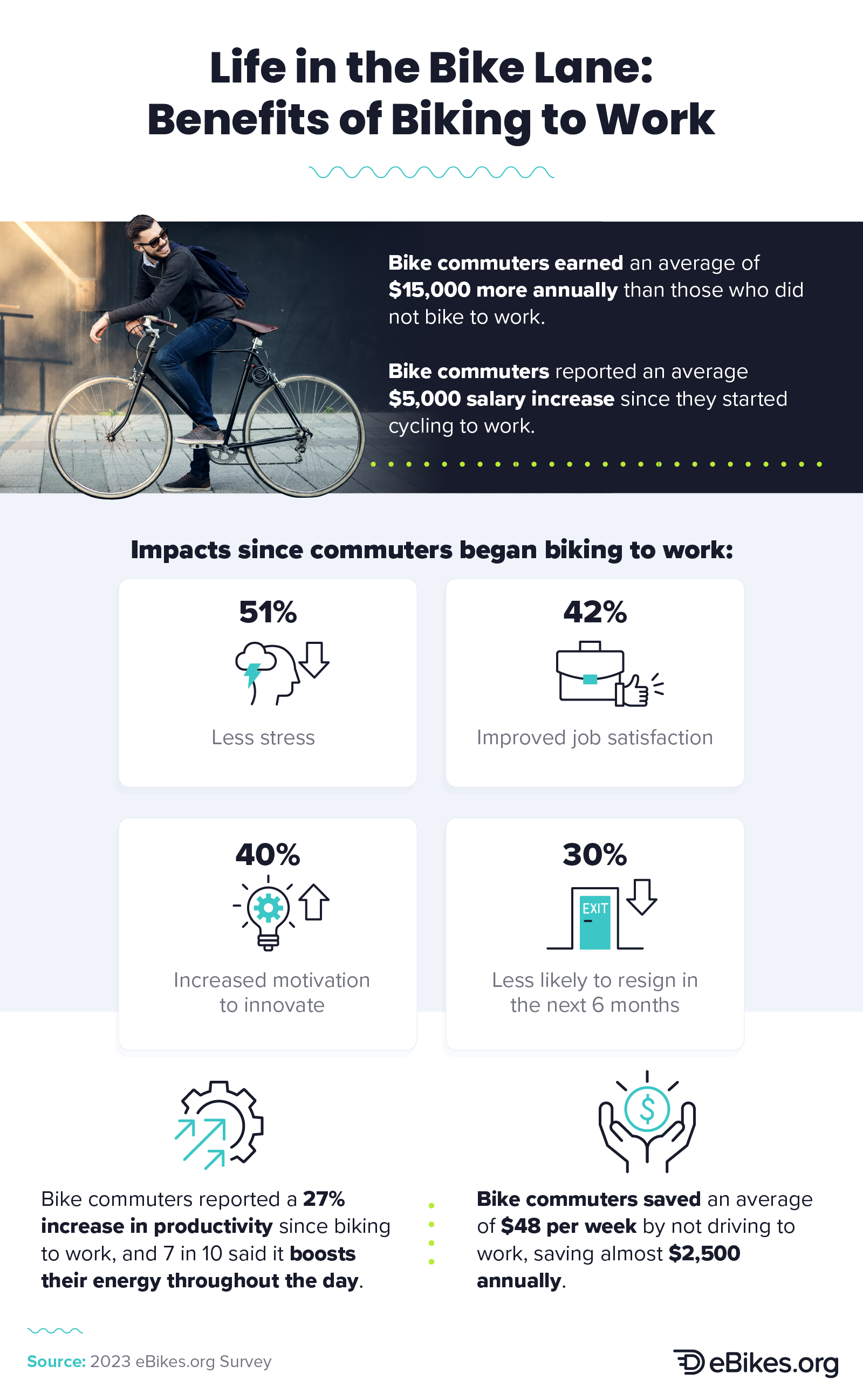
Over half the bike commuters reported decreased stress levels from cycling to work, tracking with studies showing how exercise reduces stress. Getting your heart pumping and feeling the wind on your face each morning seems to set a very different tone for the day than sitting in stinky exhaust fumes. Biking to work also reduced stress on commuters’ bank accounts, as bike commuters reported saving an average of $48 per week by not driving to work — almost $2,500 per year.
Once at work, cyclists reported several professional benefits of biking to work, including:
- More energy throughout the day (70%)
- Improved job satisfaction (42%)
- Increased motivation to innovate (40%)
- Improved productivity (by 27%)
These factors may explain why bike commuters pulled in an average of $15,000 more each year than their non-biking counterparts and why 30% reported a decrease in the possibility of quitting their job in the next six months.
Employers struggling to retain talent amid “the big quit” might want to encourage employees to adopt this energizing and motivating method of commuting. Employers can offer bike-related benefits to employees, like flex schedules to accommodate longer commute times, secure bike storage, or shower facilities.
To Bike or Not to Bike?
How far is the average bike commuter willing to ride, and how do they avoid showing up to the office smelling less than fresh?
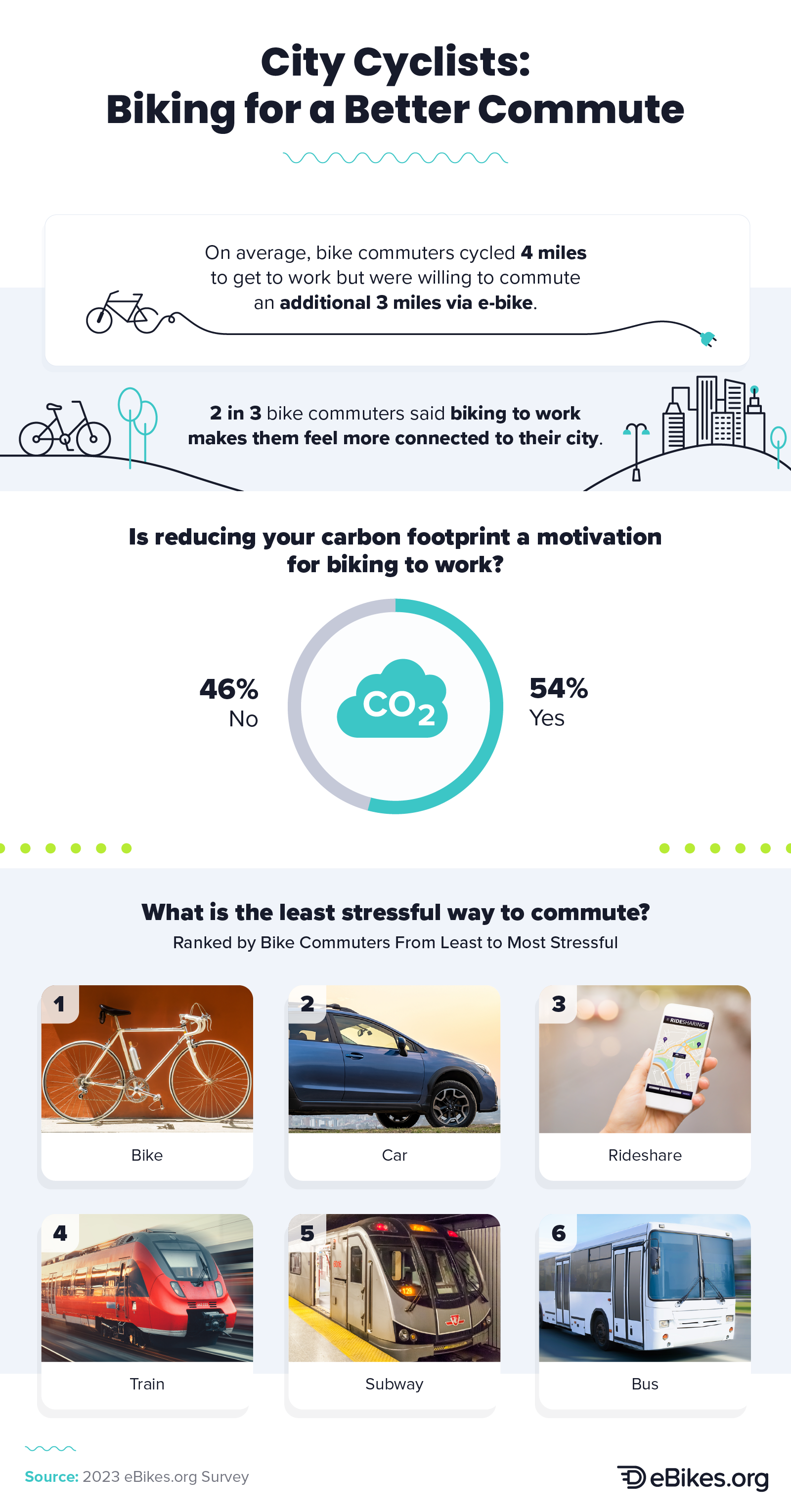
According to our survey, the average cyclist is willing to commute about four miles on a traditional bike or up to seven on a commuter e-bike. Nearly one in five bike commuters even factored distance into their job hunt and considered the inability to bike to work a dealbreaker. Millennials proved 18% more likely than Gen Z to cite carbon footprint reduction as one of their primary motivations for bike commuting.
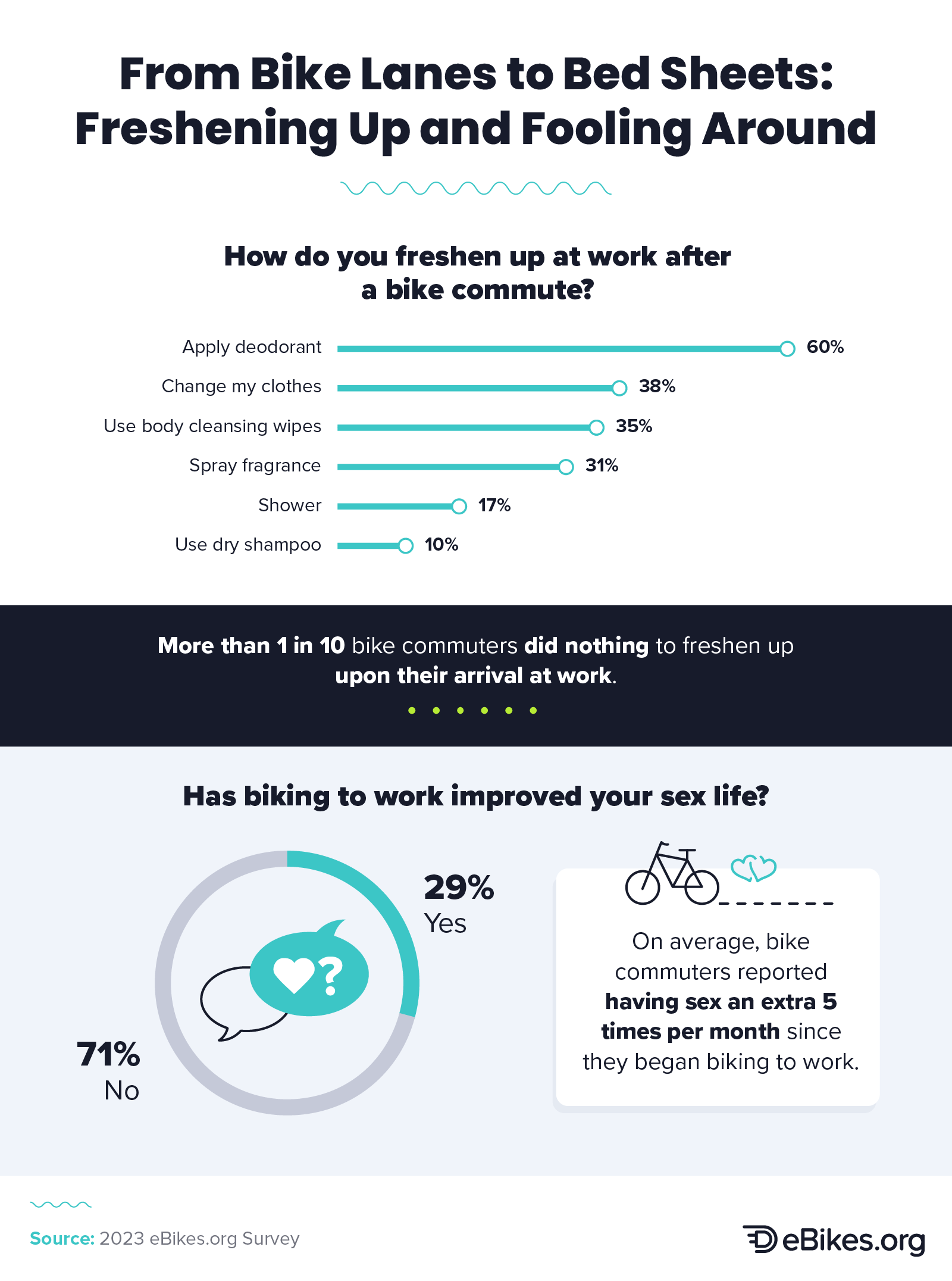
While biking to work ranked as the least stressful commute, some commuters worry about showing up to work feeling less than fresh after a bike ride. Luckily, there are a few simple fixes: 60% of bike commuters used a stick of deodorant to freshen up after a ride, and 38% brought a change of clothes. More than 10% of riders didn’t freshen up at all and just breezed into the office as-is; men were 63% more likely than women to do so.
Whether fresh as a daisy at work or not, some bike commuters reported getting a little extra fresh outside of work: almost one-quarter said their sex life improved after they began biking to work. Those lucky enough to get lucky reported having sex an extra five times per month, on average.
The Non-Biker’s Dilemma
If biking to work is so great, why doesn’t everyone do it? That’s exactly what we set out to uncover when we surveyed hundreds of commuters who don’t currently bike to work.
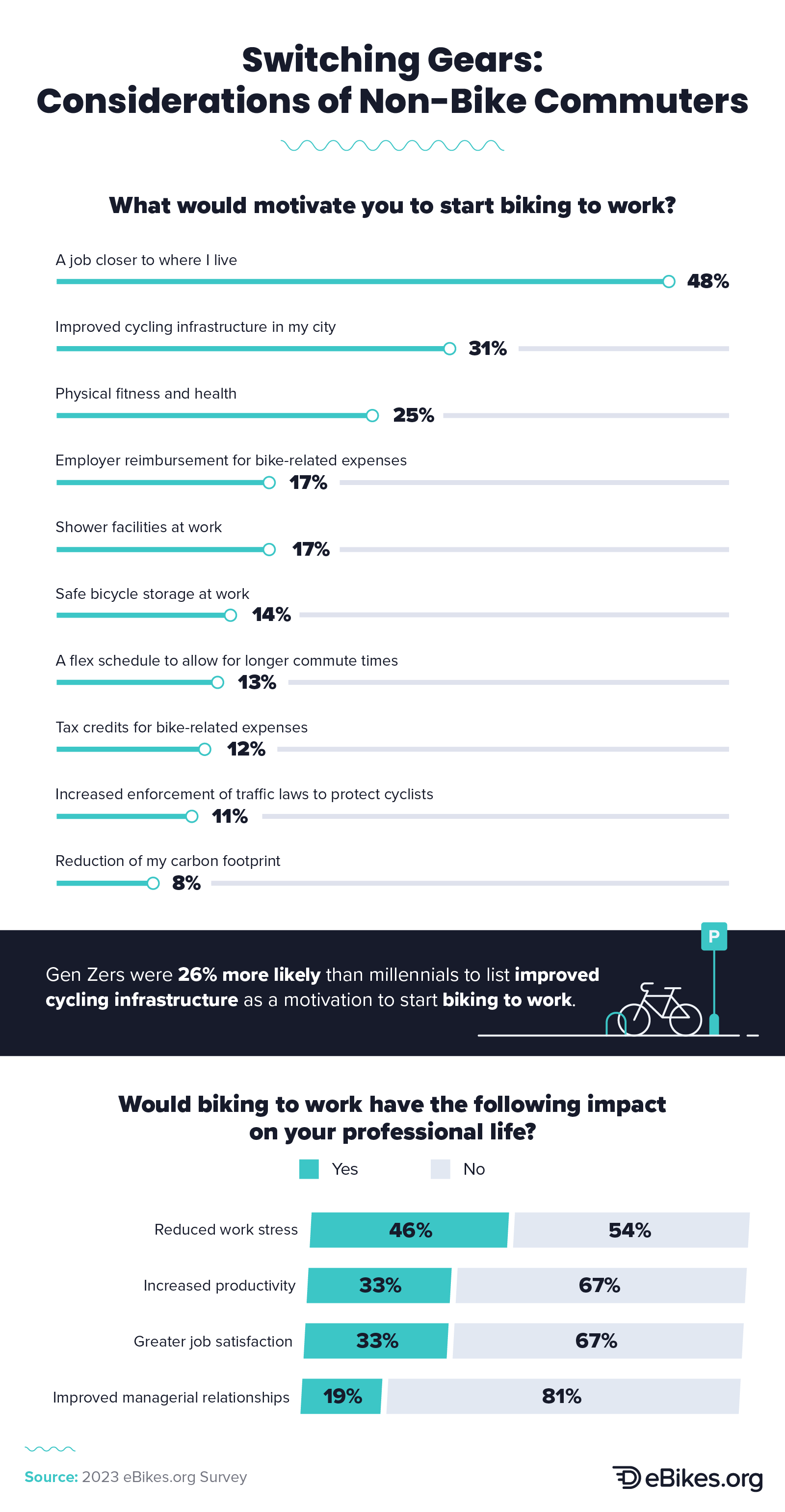
Almost half of non-bike commuters (48%) said they would bike to work if they lived closer to their job, and 25% said they would do it for physical fitness and health. Additionally, almost one-third (31%) said improved cycling infrastructure in their cities would motivate them to bike to work. For those serious about switching to a healthy bike commute, it might be worth checking out job listings in a few of the most bike-friendly cities in America. You could also see if your city is one of the many planning to launch new projects like those that produced the best new bike lanes in 2023.
But distance and infrastructure weren’t the only barriers for non-bike commuters — money and time were also factors. Over 1 in 6 said they would bike to work if their employers offered reimbursements for bike expenses, with men being 62% more likely than women to say so. Additionally, 13% would bike commute if they had a flex schedule at work; Gen Zers were 92% more likely than millennials to mention this factor.
Consider Bike Commuting
If you want to make your daily commute something you actually look forward to, consider investing in a great commuter electric bike. While we can’t guarantee that biking your way to bliss will increase your income overnight or make your boss any less surly, the evidence suggests that bicycle commuting can be a great mood and productivity booster. Make sure you do some e-bike buying research to familiarize yourself with various options and find the perfect bike for you.
Methodology
To explore commuting via bike, we surveyed 363 bike commuters living in urban areas and 675 non-biking commuters.
About eBikes.org
At eBikes.org, we’re all about offering the educational resources you need to make the most of your biking journey. Whether you’re a first-time e-bike buyer or a seasoned rider, we aim to keep you well-informed with helpful, objective information.
Fair Use Statement
Are you a believer in the bike commute? Feel free to share this article for noncommercial purposes; we ask that you provide a link back to this page so readers can access our full findings.
